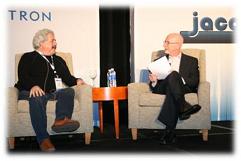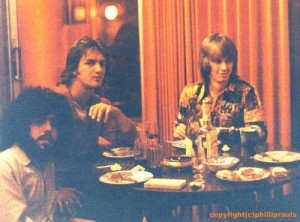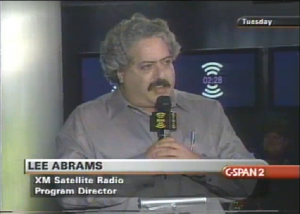As we look back at the way that broadcast radio has evolved, morphed, branched into tributaries like satellite radio and streaming audio, Lee Abrams has been at the precipice of many of these changes, often getting there first.
I think of him as radio’s “Crown Prince of Innovation.” Lee is insightful, thoughtful, out of the box, and one of radio’s great thinkers and true characters. You may not share all his philosophies, but you can never question his passion, conviction, and his risk-taking. If you’re lucky enough to sit down and have a conversation with him, you walk away inspired and very likely rethinking your assumptions.
Lee was the force behind the creation of AOR Radio, melding the best of Progressive Rock in the late ‘60s and merging it with formatics, systems, and discipline. His “Superstars” format redefined Rock Radio for anyone and everyone who programmed back in the ‘70s, and his legacy is still very evident in today’s radio formats.

From Z-Rock to his seminal role with XM Satellite Radio to his more recent stint with Tribune, Lee has always been a change agent for the radio business. His legendary consultancy, Burkhardt Abrams (and various permutations), was a force in radio in the ‘70s and ‘80s. And yes, back in the day, Lee also programmed WRIF/Detroit, my alma mater.
Back in those halcyon rock ‘n roll radio days, I found myself frequently competing against Lee’s stations, and we never had the opportunity to work together. But in the last decade or so, I have gotten to know him, as a result of inviting him to appear at a couple Jacobs Media Summits. And every time I have a conversation with him, I come away motivated, excited, and revved up about media, music, and entertainment.
In “Radio’s Most Innovative,” we always ask our honorees what it takes to bring a great idea to market. Lee Abrams truly exemplifies what it is to be an innovator as you’ll read below:
JM: At what point did you realize you had the ability to provide vision and strategic programming acumen on a large scale?
LA: Probably around 1966 or so. I was a freshman in high school…I had been watching Bill Drake and the RKO chain creating change, and immediately set that as a goal – as a way to get the particular rand of FM I had envisioned circulated.
JM: Talk about the beginnings of the “Superstars” concept as FM radio was in its embryonic stages.
LA: It was about a “place” between Underground FM and Top 40 where the familiarity factor was the artist rather than the song. The target was “vulnerable Top 40 listeners” who tuned in those stations for Santana, the Stones, etc., and punched out during Bobby Goldsboro or the Fifth Dimension. Underground Radio was a little too adventurous for them, so I created a channel that focused on the emerging album-focused artists.
The plan was that there was depth without sacrificing familiarity. You’d hear Cream, but it wasn’t necessarily “White Room.” It was another track, obviously Cream, but deep Cream. That’s where the “oh wow” factor came from “That’s Cream, but oh wow – it’s not ‘White Room’ or ‘Sunshine Of Your Love.’”
Then we’d introduce selective new music and play the hell out of it so it had a chance to burn in. And then add a layer of enhancers, like the old twofers and the like, which were brand new at the time.
We could pretty much go into any market and go #1 18-34 in one book. It was as commercial as possible without sacrificing a progressive identity. And we paid deep attention to every factor – the logo, the way the receptionist answered the phone, the style points. You don’t see that level of “completeness” anymore.
JM: Who or what were your influences in the late ‘60s and early ‘70s?

LA: Musically, Yes, Cream, Who, Mothers of Invention, B.B. King, early Genesis, and about 10,000 others. I had to be careful not to overplay my favorites.
In terms of media, simply being a part of the new mainstream was a 24/7 influence – just observing and thinking.
In terms of radio, amazing Top 40 stations from the ‘60s – WQAM, WABC, KCBQ, KHJ, WLS, etc. You learned structure and discipline…and outrageousness listening to those guys.
JM: At what point did you realize “Superstars” was a mega-hit?
LA: My first client WQDR in Raleigh. First book, and it was “Shit, this is real!”
JM: What’re your funniest stories from those days?
LA: Ha! You won’t trick me into that one. Most of them were borderline illegal, involving psychotic employees or they’re just too out there.
JM: Tell us about Z-Rock – how it came together and the impact it had.
LA: After 15 years of “Superstars,” 6 days a week travel, body abuse, and the other pitfalls of rock n’ roll, I was pretty burned out. I still had a million ideas but needed a change. Our company had helped launch Satellite Music Network, and I had a great relationship with John Tyler, their CEO. I was actually involved with Bob Pittman and Les Garland, and we were going to do a global hard rock network called “Radio Lisa.” But we ran into snags and John Tyler called and said, “Let’s do Z-Rock,” so we did.
It was a great channel, and I think it influenced a lot of the Hard Rock movement that was emerging – the Metallica Era. The problem was that affiliates tended to be weaker signals, and there was an aversion to major players taking a 24/7 satellite feed. But it was a lot of fun, the channel made money, and we learned a lot. ABC later acquired us.
JM: And then your move to XM Radio. What was the vision and in retrospect, has satellite radio lived up to its early hype?
LA: It was amazing! A renaissance for me, personally. Go to www.leeabrams.blogspot.com. I chronicled most of it in 123 longish posts. The vision was a complete reimagination of radio. We threw out the playbook and picked apart AM and FM to find the vulnerabilities, hand-picked the staff, and held boot camps to reinvent. I can’t say enough good things about it on every level. Finally, a place to make magic without traditional thinking.

When the merger happened, I think they went into a far more old school direction. But I remain a fan, and happy to see them as the highest billing radio company on earth.
JM: Then there was the Tribune experience. You guys had some amazing ideas. Where did it go wrong and what did you learn?
LA: Very simple. It was as if I was the drummer in Slayer trying to play with the Berlin Symphony. In reality, there were a lot of fantastic people there who wanted to move forward, but that soul of Tribune was “old newspaper company.” Add to that arriving when they went into bankruptcy.
It was loaded with committees and baggage. It was a tough situation for any person charged with fixing it. Our management team did indeed bring the papers to profitability. But it was just the wrong place at the wrong time. Now they are reorganizing and in a far better position to grow. Though I still think as long as they’re named Tribune, the ghost of the 1930s will live on.
JM: Your biggest regret?
LA: Not buying some of those stations we consulted! And all the drugs and booze in the ‘70s. Of course, the whole business was stoned and it sure was fun, but I could have been more imaginative.
JM: And your most significant accomplishment that makes you proudest?
LA: There’re two. Despite the incredible beating we’d take from the pundits, Superstars was the soundtrack of America in the ‘70s and ‘80s.
But XM was so sharply executed and inventive – that would have to be in there, too. It’s funny that Superstars was very tight, and XM was the opposite – not to be design, but that’s what the era dictated in order to win.
Ya gotta flow with what the era demands. In 1970, it was the great tracks and next generation stars. In 2000, it was deeper and more adventurous by the existing radio standards.
JM: What innovations or innovators are you keeping an eye on – who impresses you?
LA: It’s pretty much the same ones for everyone else. Musk, Google, Apple. Then filmmakers like (James) Cameron. These people are inspirations, pushing it – the antithesis of the tired, big American companies.
JM: Can broadcast radio reinvent itself, and if so, how?
LA: Yes, but they better hurry. It’s like there are FCC laws guiding programming and marketing so everything looks and sounds the same way. Local TV is in the same place. If a station is making money, OK. If not, it’s time for violent media revolution.
JM: How do you feel when you turn on a radio station today and hear “Twofer Tuesday?”
LA: In shock. That idea is 40 years-old! In today’s environment with Pandora, satellite, etc., to be so incredibly behind the content innovation curve is mind-blowing. OK, but some things are timeless trademarks, but a “twofer” is Smithsonian.
JM: What advice would you give to someone with a potentially innovative idea that is having trouble getting it off the ground?
LA: Be sure the idea is original – real original, thought out, structured, blueprinted. The more people who think you’re an idiot, the better. Then of course, you’ll be a genius when it works.
Also patience – I’m working on a very ambitious new thing – it’s taken over two years and we are just now getting funded.
Don’t bother with people who are comfortable or “have the answers.” Go to people who are in-sync with 2015 and beyond, and live to design the future.
If you are not a good financial type, bring in someone who is, as you’ll need that to sell a big idea.
Have incredible courage and don’t think twice about the haters – they used to call us losers. Would you pay attention to a loser?
The most important thing – AFDI – actually f___ing do it. Do not give up. It seems like many in older media have given up or given in to the playbook. Bad idea.
We are at a historical crossroads in media history – the time to join is now! Today reminds me of 1969 – the old school radio guys were often in denial about the new culture and the new technology (FM). Today, I’m seeing that same thing. If you want to change the world, now is a great time. And the answer is creating content that matches the era and the technology.
INNOVATION QUOTE OF THE WEEK
“NASA has this phrase that they like, ‘Failure is not an option.’ But failure has to be an option. In art and exploration, failure has to be an option. Because it is a leap of faith. And no important endeavor that required innovation was done without risk. You have to be willing to take those risks. … In whatever you are doing, failure is an option. But fear is not.”
James Cameron, film director
More of Radio’s Most Innovative
- Radio’s Most Innovative: Radioplayer
- Radio’s Most Innovative: Jerry Lee
- Radio’s Most Innovative: John Fullam/Greater Media Philly Innovation Challenge
- Radio’s Most Innovative: Greater Public’s Doug Eichten
- Radio’s Most Innovative: Zach Sang, Part 2
- What To Do If Your Radio Station Goes Through A Midlife Crisis - April 25, 2025
- A 2020 Lesson?It Could All Be Gone In A Flash - April 24, 2025
- How AI Can Give Radio Personalities More…PERSONALITY - April 23, 2025





Lee is a great guy – let me add the one thing that’s missing from this tribute is what a positive infectious influence his is on everyone around him. Lee somehow merges being one of the most fun hangs in the business with his ideas, so you look forward to time with him and somehow end up with something actionable out of an ad hoc party.
I’ll never forget his fake resume for Pumpsie Green…
He is a great hang. I regret not having worked with him during the days when I worked in stations. Thanks for sharing the memories.
This column contains wisdom from tww of the greatest thinkers ever in radio. I owe my career to Lee Abrams. He, patiently, took this wild, passionate, and beyond ‘borderline legal’ kid and taught him how to preserve magic in a monetized environment. For Fred to regale his former ‘competitor’ demonstrates what a supremely class act he is.
I often thank Fred for his spirit in today’s radio climate. I pray for Lee’s rightful return to prominence.
My gratitude to you both…
Sky, too kind, but very appreciated. I am a big fan of Lee’s…and yours…and how both of you guys have navigated the crazy media waters over these many years. Thanks again.
I learned more from Lee Abrams in a month than I had in all the years up to the point of getting hired by him at XM. Can’t wait to see what he has up his sleeve next.
AFDI… Lee!
One bright and creative guy, Mike. Thanks for commenting.